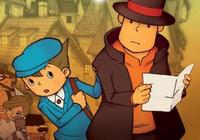Professor Layton and the Curious Village (Nintendo DS) Second Opinion Review
By Camilo Aránguiz González  15.02.2017
15.02.2017

With six released games and an upcoming one, a spin-off and a full-length animated film, the Professor Layton franchise has enough curriculum for disputing the hall of fame of puzzle-adventure games. After 10 long years, though, will the first instalment stand the test of time and the loupe of Cubed3?
Readers probably remember that in the 90s, point-and-click adventures lived in a golden age: the King's Quest series, The Secret of Monkey Island and Myst are just fine examples of a large wave of games favoured by the high valuation of the plot and limited PC technology that got along with the characteristic interfaces.
Although not a pure point-and-click adventure, Professor Layton and the Curious Village is, at least, an admirable reminder of those games, with an amazingly similar interface and rhythm, but with much stronger emphasis on puzzles—and that's because the game itself revolves around puzzles. Story, characters, gameplay. As it happens with musicals, where people often wonder why the heck all the people sing, in Professor Layton games, it is required to have an equally high suspension of disbelief to truly experience and enjoy the plot and progress of the adventure. In other words, The Curious Village asks the player to accept its puzzle-obsessed nature, despite trying to justify it at some times.
That obstacle overcome, Professor Layton and the Curious Village calmly unfolds a delightful story: the search for the Golden Apple, the key for inheriting the fortune of deceased baron Reinhold, demands the skills of English archaeologist Hershel Layton - and his apprentice, Luke Trion - to unravel the mystery. Soon enough, however, things start to become very intricate when a murder takes place and our protagonists slowly realise that the village of St. Mystere has a lot of strange inhabitants and events within its streets.

Narrative is exquisite and unique, allowing the player to taking their time exploring environments and uncovering hidden puzzles. However, for some people, it doesn't have a fluent interaction with the puzzles themselves, which represent a huge part of The Curious Village's gameplay facet. For others, the change between one and another is a welcomed change of pace that prevents monotony.
Furthermore, puzzles are extremely varied: mathematical problems, riddles, slide-puzzles, just to name a few. On top of that, there're some mini-game puzzles that follow Layton throughout the game, like a jigsaw puzzle of a painting and a simple room-design game.
Nevertheless, while Professor Layton and the Curious Village's narrative and gameplay are stupendous, where it really excels is in its presentation. The cartoony but detailed art design delivers several iconic characters - starting with Professor Layton himself - and wonderful backgrounds, which are a pleasure to explore. No two places or characters look alike.

Correspondingly, the music is absolutely enchanting, with a strong uniqueness that will make you say, whenever you listen to a French-styled song, "that sounds like a Professor Layton track." Violin and accordion step ahead and summarise all the good attributes of the game: heavy-thinking, the correctness and style of the professor, the cartoony, incredibly alive, and undeniable European characters and locations. It is one of those soundtracks that can be listened to without the game being played.
The Curious Village has the virtue of setting the formula that future Professor Layton games followed, despite the interface being a little clunky once we return from the 3DS instalments, but in no way is it unplayable by today's standards, even if the point-and-click mechanics are old fashioned.
However, replay value and linearity are the major flaws of Professor Layton and the Curious Village, which are probably the consequences of a strong and literary storytelling. Once the player solves all the puzzles, a few years will have to pass for having a reason for replaying the game. Even so, the story is so charming that a second chance will never be a waste of time.

In the end, Professor Layton and the Curious Village manages to not only be an exquisite game with entertaining puzzles, captivating plot and gorgeous presentation, but it also presents, from a more art-making point of view, two relevant stances that are present throughout its playthrough.
The first one is the resolute ideology of Professor Layton about what defines a gentleman, and how Luke learns that from him. From his clothing style and always calm nature, to the duty of helping others in need, being ladies or men, Professor Layton incarnates the old classic gentleman. As he said once: "I like to think that chivalry isn't dead… it's only hibernating."
The second one is about where logic, reason, and critical thinking can take us (that will be a reminder of outstanding pieces of art like Sherlock Holmes or Dr. House), but not in a blind, cold-hearted way (several times throughout the game, Layton follows his "famous" intuition): no matter how unbelievably bizarre it is what we experience, the answer always can be uncovered by our brains, or as our beloved Hershel Layton will say: "Every puzzle has an answer."

Cubed3 Rating
Exceptional - Gold Award

The first instalment of the Professor Layton series has the merit of creating the formula that future games followed and improved upon - but not by much. Superb narrative, amusing puzzle-solving and exploration, and magnificent, distinctive presentation, as well as thoughtful viewpoints that deserve reflection, make The Curious Village a must-play for adventure and puzzle-loving gamers, and a lasting masterpiece for the DS library.
Comments
Comments are currently disabled

 Sign In
Sign In Game Details
Game Details
 Out now
Out now  Out now
Out now  Out now
Out now  Out now
Out now  Subscribe to this topic
Subscribe to this topic Features
Features






 Top
Top

